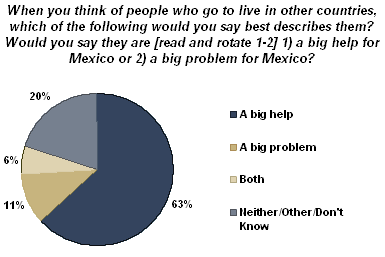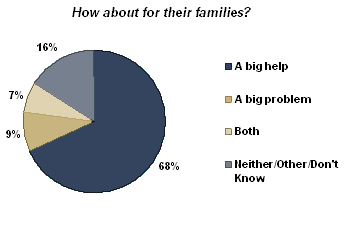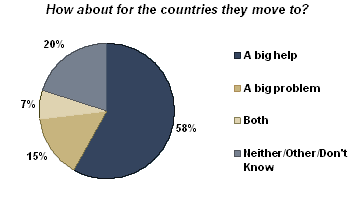Results 1 to 5 of 5
Thread Information
Users Browsing this Thread
There are currently 1 users browsing this thread. (0 members and 1 guests)
-
04-04-2006, 07:33 PM #1
Gallup World Poll: Mexicans and Migration
http://poll.gallup.com/content/?ci=22237
April 04, 2006
Gallup World Poll: Mexicans and Migration
United States lawmakers should consider public opinion south of the border
by Jesus Rios and Steve Crabtree
GALLUP NEWS SERVICE
PRINCETON, NJ -- The current immigration debate has produced much speculation about the effect of tougher immigration laws on the United States economy. Those in favor of greater restrictions argue that illegal immigrants benefit from free education, welfare, and healthcare services, in some states making those essential services less available to American taxpayers. There are also widespread concerns -- voiced by Colorado representative Tom Tancredo and others -- that the steady flow of undocumented migrants from Mexico to the United States leaves the border vulnerable to infiltration by terrorists. Tancredo has called for the construction of a 700-mile fence along the border, a measure incorporated into the immigration bill passed by the United States House of Representatives last December.
Others, including President Bush and the hundreds of thousands of demonstrators who have turned out in the last two weeks to protest tougher immigration laws, emphasize the contribution of Latin American immigrants to the U.S. economy. According to the Pew Hispanic Center, unauthorized migrants make up about 5% of the U.S. labor force, including 24% of all workers employed in U.S. farming occupations, 17% in cleaning jobs, and 14% in construction. Pew also estimates that about 500,000 new migrants enter the U.S. illegally every year.
Amid all the rancor, there's another perspective that's critical for U.S. policy-makers to consider: That of the Mexican people. Gallup World Poll data from Mexico highlight the impact that cutting off migration to the U.S. would have on the Mexican economy. Thirty-two percent of Mexican respondents in the Dec. 2-15, 2005 poll claim to have relatives living abroad, and 15% of those say their households receive a monthly cash aid from such relatives. Those figures imply that about 5% of the Mexican households receive such aid every month. Cutting off such remittances would remove a critical source of income for about 20 million Mexicans, most of whom reside in poor and rural areas.
It may be difficult for many Mexicans not to take tough anti-immigration rhetoric personally, because they don't see the downside for the United States. World Poll data indicate majorities of Mexicans believe that migration benefits not only the home countries and the families of those who migrate, but the countries those migrants move to as well.



These data indicate that most Mexicans would agree with President Bush's view that immigration is not a zero-sum game. That is, Mexican migrants aren't boosting their home country's economy at the expense of American workers, but that the added stimulus benefits the U.S. economy even as it provides a critical source of income for the Mexican economy. Efforts to cut off that stimulus would seem spiteful to many Mexicans.
The Weight of Mexican Public Opinion
Why should the Mexican perspective matter to Americans? Because, as the Council on Foreign Relations recently pointed out, at a time when the United States needs allies around the globe, its relations with Latin American nations are at their lowest point since the end of the Cold War. Six of the most important countries in the region are currently led by left-leaning governments that are, at best, less cooperative than Washington would like.
Mexico is still by far the most important U.S. ally in the region, a signatory of the North American Free Trade Agreement that generally maintains friendly diplomatic relations with the United States. But according to World Poll data, just 33% of Mexicans say they approve of the leadership in their own country, while 57% disapprove. Twenty-four percent of Mexicans say they approve of leadership in the United States while 47% disapprove. With a presidential election approaching in July, Mexicans may be on the verge of making some big changes, not all of which may be favorable to U.S. interests.
Foreign policy analysts have observed that in the long term the United States cannot afford to see democracies continually stumble in Latin America and be replaced by unfriendly regimes. The United Nations Development Programme's recent Democracy in Latin America report describes a potentially dangerous decline in support for democracy among impoverished Latin Americans, a trend reflected in Gallup's World Poll data from Venezuela and Brazil. A sudden economic destabilization may produce a similar effect in Mexico. The resulting loss of freedom has the potential to not only worsen illegal immigration, but complicate it with hatred and violence among Mexicans, posing additional risks to America's homeland security.
Certainly, immigration reform is one of the toughest issues currently facing the U.S. government. But whatever strategy is adopted, policy makers should factor in the enormous implications for Mexico and other Latin American countries if the curtailing of democracy in the region is to be avoided and sustainable regional security is to be achieved.
Survey Methods
These results are based on face-to-face interviews with randomly selected national samples of approximately 1,000 adults, aged 15 and older who live permanently in Mexico, conducted Dec. 2-15, 2005. For results based on these samples, one can say with 95% confidence that the maximum error attributable to sampling and other random effects is ±3 percentage points. In addition to sampling error, question wording and practical difficulties in conducting surveys can introduce error or bias into the findings of public opinion polls.Support our FIGHT AGAINST illegal immigration & Amnesty by joining our E-mail Alerts at http://eepurl.com/cktGTn
-
04-04-2006, 07:39 PM #2Senior Member

- Join Date
- Mar 2006
- Location
- Dallas, TX
- Posts
- 1,672
please notice this is a public opinion study of PERMANENT Mexican residents.
-
04-04-2006, 08:14 PM #3
Please! Is anyone that takes polls, asking many American's if they think illegal immigration is good...because I haven't had one call...have any of you?
Do not vote for Party this year, vote for America and American workers!
-
04-05-2006, 03:34 AM #4A president with approval ratings somewhere in the 34% area, whose administration has made blunder after blunder, who speaks only in platitudes and a group of illegal marauding demonstrators waving foreign flags likely being among the least successful in their own countries which are among the least successful countries who justify their presence here with irrelevant clichés are the ones we want dictating our foreign, domestic, and immigration policies? I would prefer not. Would we really expect illegal aliens to emphasize their detriment to the economy? Get real!Others, including President Bush and the hundreds of thousands of demonstrators who have turned out in the last two weeks to protest tougher immigration laws, emphasize the contribution of Latin American immigrants to the U.S. economy.
Not having that 5% would likely reduce the 7.5% plus domestic unemployment rate in the lower skilled and lower education jobs.According to the Pew Hispanic Center, unauthorized migrants make up about 5% of the U.S. labor force
Not seeing, or not admitting, a downside doesn't mean there isn't one. I really wouldn't expect that Mexicans in general would be all that knowledgeable or objective or concerned about what is good for the United States. A big percentage of Mexicans also believe that the U.S. stole half of Mexico. So, should we just give it back so that they will like us better and not take it personally?It may be difficult for many Mexicans not to take tough anti-immigration rhetoric personally, because they don't see the downside for the United States. World Poll data indicate majorities of Mexicans believe that migration benefits not only the home countries and the families of those who migrate, but the countries those migrants move to as well.
Who would be surprised that President Bush would agree with the Mexicans and not with the Americans? If Mexicans are such experts at running a country wouldn't their own country be running better and there would be no need or desire for either legal or illegal U.S. immigration? Cry me a river, Vicente, on the spiteful stuff.These data indicate that most Mexicans would agree with President Bush's view that immigration is not a zero-sum game. That is, Mexican migrants aren't boosting their home country's economy at the expense of American workers, but that the added stimulus benefits the U.S. economy even as it provides a critical source of income for the Mexican economy. Efforts to cut off that stimulus would seem spiteful to many Mexicans.
Relations with Latin American nations are at the lowest point since the cold war? Then that lowest point correlates with the Bush Presidency, free trade agreements coming to fruition, and increased CFR activity. Is that coincidence? If left-leaning governments are undesirable, then does it make sense to have millions of immigrants who likely condoned and participated in establishing those governments coming here if we don't want a left-leaning government? If family values don't stop at the border, why would social, economic, and governing values? It appears that the CFR suggests solving problems by doing more of what created the problems.Why should the Mexican perspective matter to Americans? Because, as the Council on Foreign Relations recently pointed out, at a time when the United States needs allies around the globe, its relations with Latin American nations are at their lowest point since the end of the Cold War. Six of the most important countries in the region are currently led by left-leaning governments that are, at best, less cooperative than Washington would like.
So, our U.S. foreign policy should be to allow all the residents of every troubled country, especially if those residents don't like us, to immigrate to the U.S. so that they will like us in the country that they all left?Certainly, immigration reform is one of the toughest issues currently facing the U.S. government. But whatever strategy is adopted, policy makers should factor in the enormous implications for Mexico and other Latin American countries if the curtailing of democracy in the region is to be avoided and sustainable regional security is to be achieved.
I think Gallup should stick to purely polling.
-
04-05-2006, 11:21 AM #5Why should the Mexican perspective matter to Americans? Because, as the Council on Foreign Relations recently pointed out, at a time when the United States needs allies around the globe, its relations with Latin American nations are at their lowest point since the end of the Cold War. Six of the most important countries in the region are currently led by left-leaning governments that are, at best, less cooperative than Washington would like.
There it is folks! The Council on Foreign Relations is behind this whole thing!
WJoin our efforts to Secure America's Borders and End Illegal Immigration by Joining ALIPAC's E-Mail Alerts network (CLICK HERE)


 LinkBack URL
LinkBack URL About LinkBacks
About LinkBacks




 Reply With Quote
Reply With Quote

Breaking! America's Border Crisis is Worse Than We Imagined! -...
04-30-2024, 11:07 PM in Videos about Illegal Immigration, refugee programs, globalism, & socialism